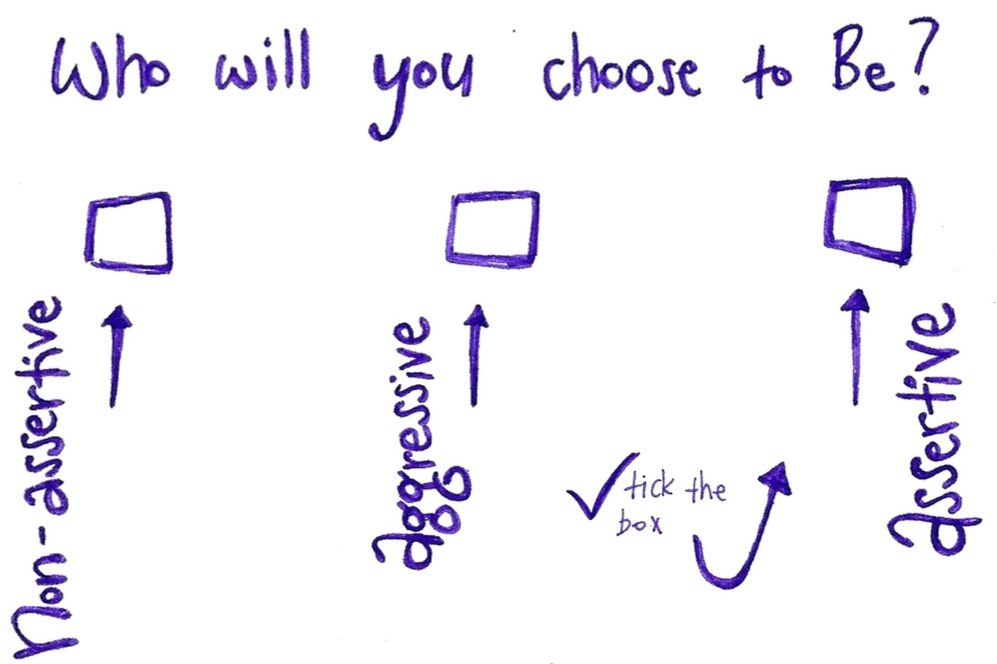Who speaks for you? Learn to be Assertive with Self Crafting
Do you find yourself saying Yes, when you really mean No? You can learn to be assertive, increase confidence and develop a commitment to your Self and your boundaries.
How were you taught to take up space?
When I teach Anxiety-informed Martial Arts and Self Defense as Self Development, a key concept is to become aware of "Who Speaks For You?"
So much of how we show up in the world is learned behaviour, and a lot of it happened before we were six years old. Other parts of us develop in response to frightening or overwhelming experiences (trauma). Perhaps, as a kid you learned that there was no point setting boundaries, because the people around you would always invade your privacy and disrespect your self-space regardless. Or maybe you learned that asserting what you wanted was dangerous, and could end in punishment. For some people, they were simply never shown how to hold a boundary or show up with confidence.It wasn't you, it was them. But now it's you, and it's affecting your ability to create a life that sets you free.I can help you with that.
Non-assertive, aggressive or assertive?
Are you typically non-assertive, aggressive or assertive? How you show up in any situation will have a lot to do with the way you relate and react, ie. who you speak as in the world.
Aggressive people appear to attract more physical and argumentative trouble (probably because they are always in the argumentative mode). Non-assertive people have a continual pattern of being "walked over" and finding themselves in positions where they are without power.
Who speaks for you?
If the way we speak into the world is a matter of learned behaviour, it can be useful to find out which 'part' of you is speaking. Your experiences as a young person, the effects of developmental stages and the people who were around you at that time, help to shape the person you become.
Notice when you speak, who is speaking? Do you recognise a voice or a pattern of behaviour in yourself that is also recognisable in the adults you knew as a child. OR, do you notice how your behaviour could have been shaped as a result of the adults who were in your world when you were a child?
In Sessions I use a method known as Voice Dialogue to find a deeper understanding to the vulnerabilities and powers that drive the parts of you that are speaking.
Learn to be assertive
Assertive people are known for their ability to handle confrontations in a balanced and diplomatic way. This is a skill that can be learned and practised. It is more than conversation technique. It requires holistic development of the self - otherwise known as Self Crafting.
Assertive people also find themselves with less need to actually have to defend themselves, as they are more often in charge of their surroundings (awareness) and confident in their points of view. Speaking from your assertive place is a skill that can be developed in many ways and all those ways have one universal key : embodiment of authenticity.
When you speak into the world, who would you prefer to speak as?
Notice who speaks for you most often:
[columns] [span4]Non-assertive
- Play it safe and be liked
- Fearful of being yelled at
- Sensitive to disapproval
- Disrespectful to Self
- Accepts others more than Self
- Keeps feelings inside
- Often feels anxious, sad, isolated, misunderstood
- Scared of being wrong
[/span4][span4]Aggressive
- Have to be right and prove your point of view
- Uses verbal and physical force
- Insensitive to others
- Disrespectful to others
- Uses "You" statements
- Judgmental, feels superior
- Easily gets angry
- Hides insecurity
- Needs to be right
[/span4][span4]Assertive
- Desire to express with honesty and kindness
- Uses "I" statements
- Caring to both Self and others
- Fairness over rightness
- Tactful and diplomatic
- Feels secure and confident
[/span4][/columns]
Anyone can learn to be assertive
Each "speaker" is available to every person and you can learn to be assertive more in everyday life. In Sessions we work on honing your attention and practising how you desire to show up in the world. Y
ou could ask the question "Who am I being right now?" It helps to get clear on exactly what motivates the way you are expressing yourself. And it serves to give you a focus for change.

Embodiment to learn to be assertive
There's a spectrum of ways to develop confidence and learn to be more assertive. In Sessions we work on the parts who "speak", how it feels to be in the spaces both inside and outside your body, the thoughts that keep you from asserting boundaries, the practise of saying and doing what you desire...I also teach people to find the assertive Self through Natural Movement. My Ninja school, Motion Ninja Academy has been designed to cultivate the exact blend of Awareness, Self Defense, Embodiment, Mobility, Natural Movement and cutting edge methods for overall mind and body wellness. It's another way to Do Self Crafting.

